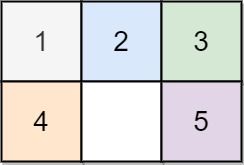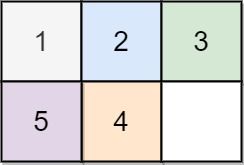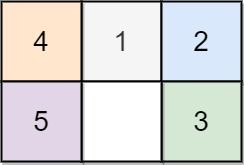Welcome to Subscribe On Youtube
773. Sliding Puzzle
Description
On an 2 x 3 board, there are five tiles labeled from 1 to 5, and an empty square represented by 0. A move consists of choosing 0 and a 4-directionally adjacent number and swapping it.
The state of the board is solved if and only if the board is [[1,2,3],[4,5,0]].
Given the puzzle board board, return the least number of moves required so that the state of the board is solved. If it is impossible for the state of the board to be solved, return -1.
Example 1:

Input: board = [[1,2,3],[4,0,5]] Output: 1 Explanation: Swap the 0 and the 5 in one move.
Example 2:

Input: board = [[1,2,3],[5,4,0]] Output: -1 Explanation: No number of moves will make the board solved.
Example 3:

Input: board = [[4,1,2],[5,0,3]] Output: 5 Explanation: 5 is the smallest number of moves that solves the board. An example path: After move 0: [[4,1,2],[5,0,3]] After move 1: [[4,1,2],[0,5,3]] After move 2: [[0,1,2],[4,5,3]] After move 3: [[1,0,2],[4,5,3]] After move 4: [[1,2,0],[4,5,3]] After move 5: [[1,2,3],[4,5,0]]
Constraints:
board.length == 2board[i].length == 30 <= board[i][j] <= 5- Each value
board[i][j]is unique.
Solutions
A* search.
-
class Solution { private int m = 2; private int n = 3; public int slidingPuzzle(int[][] board) { String start = ""; String end = "123450"; String seq = ""; for (int i = 0; i < m; ++i) { for (int j = 0; j < n; ++j) { start += board[i][j]; if (board[i][j] != 0) { seq += board[i][j]; } } } if (!check(seq)) { return -1; } PriorityQueue<Pair<Integer, String>> q = new PriorityQueue<>(Comparator.comparingInt(Pair::getKey)); Map<String, Integer> dist = new HashMap<>(); dist.put(start, 0); q.offer(new Pair<>(f(start), start)); int[] dirs = {-1, 0, 1, 0, -1}; while (!q.isEmpty()) { String state = q.poll().getValue(); int step = dist.get(state); if (end.equals(state)) { return step; } int p1 = state.indexOf("0"); int i = p1 / n, j = p1 % n; char[] s = state.toCharArray(); for (int k = 0; k < 4; ++k) { int x = i + dirs[k], y = j + dirs[k + 1]; if (x >= 0 && x < m && y >= 0 && y < n) { int p2 = x * n + y; swap(s, p1, p2); String next = String.valueOf(s); if (!dist.containsKey(next) || dist.get(next) > step + 1) { dist.put(next, step + 1); q.offer(new Pair<>(step + 1 + f(next), next)); } swap(s, p1, p2); } } } return -1; } private void swap(char[] arr, int i, int j) { char t = arr[i]; arr[i] = arr[j]; arr[j] = t; } private int f(String s) { int ans = 0; for (int i = 0; i < m * n; ++i) { if (s.charAt(i) != '0') { int num = s.charAt(i) - '1'; ans += Math.abs(i / n - num / n) + Math.abs(i % n - num % n); } } return ans; } private boolean check(String s) { int n = s.length(); int cnt = 0; for (int i = 0; i < n; ++i) { for (int j = i + 1; j < n; ++j) { if (s.charAt(i) > s.charAt(j)) { ++cnt; } } } return cnt % 2 == 0; } } -
class Solution { public: int m = 2; int n = 3; int slidingPuzzle(vector<vector<int>>& board) { string start, seq; string end = "123450"; for (int i = 0; i < m; ++i) { for (int j = 0; j < n; ++j) { start += char(board[i][j] + '0'); if (board[i][j] != 0) seq += char(board[i][j] + '0'); } } if (!check(seq)) return -1; typedef pair<int, string> PIS; priority_queue<PIS, vector<PIS>, greater<PIS>> q; unordered_map<string, int> dist; dist[start] = 0; q.push({f(start), start}); vector<int> dirs = {-1, 0, 1, 0, -1}; while (!q.empty()) { PIS t = q.top(); q.pop(); string state = t.second; int step = dist[state]; if (state == end) return step; int p1 = state.find('0'); int i = p1 / n, j = p1 % n; for (int k = 0; k < 4; ++k) { int x = i + dirs[k], y = j + dirs[k + 1]; if (x < 0 || x >= m || y < 0 || y >= n) continue; int p2 = x * n + y; swap(state[p1], state[p2]); if (!dist.count(state) || dist[state] > step + 1) { dist[state] = step + 1; q.push({step + 1 + f(state), state}); } swap(state[p1], state[p2]); } } return -1; } bool check(string s) { int n = s.size(); int cnt = 0; for (int i = 0; i < n; ++i) for (int j = i; j < n; ++j) if (s[i] > s[j]) ++cnt; return cnt % 2 == 0; } int f(string s) { int ans = 0; for (int i = 0; i < m * n; ++i) { if (s[i] == '0') continue; int num = s[i] - '1'; ans += abs(num / n - i / n) + abs(num % n - i % n); } return ans; } }; -
class Solution: def slidingPuzzle(self, board: List[List[int]]) -> int: m, n = 2, 3 seq = [] start, end = '', '123450' for i in range(m): for j in range(n): if board[i][j] != 0: seq.append(board[i][j]) start += str(board[i][j]) def check(seq): n = len(seq) cnt = sum(seq[i] > seq[j] for i in range(n) for j in range(i, n)) return cnt % 2 == 0 def f(s): ans = 0 for i in range(m * n): if s[i] != '0': num = ord(s[i]) - ord('1') ans += abs(i // n - num // n) + abs(i % n - num % n) return ans if not check(seq): return -1 q = [(f(start), start)] dist = {start: 0} while q: _, state = heappop(q) if state == end: return dist[state] p1 = state.index('0') i, j = p1 // n, p1 % n s = list(state) for a, b in [[0, -1], [0, 1], [1, 0], [-1, 0]]: x, y = i + a, j + b if 0 <= x < m and 0 <= y < n: p2 = x * n + y s[p1], s[p2] = s[p2], s[p1] next = ''.join(s) s[p1], s[p2] = s[p2], s[p1] if next not in dist or dist[next] > dist[state] + 1: dist[next] = dist[state] + 1 heappush(q, (dist[next] + f(next), next)) return -1